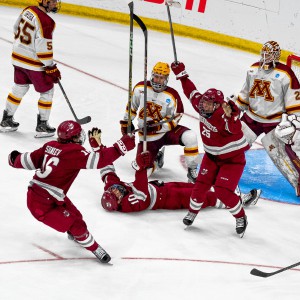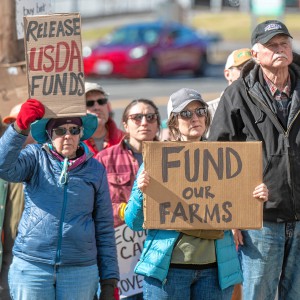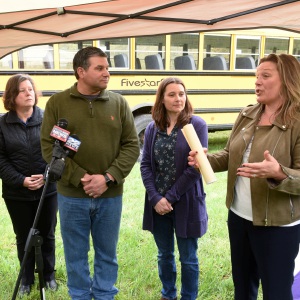Belchertown becomes first in WMass to phase out nicotine sales

Belchertown High School’s Helping Hands Club stands in front of the Board of Health with posters in favor of the nicotine-free generation regulations. The board later passed the measure, the first in western Massachusetts to do so. STAFF PHOTO/EMILEE KLEIN
|
Published: 12-12-2024 5:46 PM
Modified: 12-13-2024 11:48 AM |
BELCHERTOWN — The Board of Health has approved regulations prohibiting the sale of nicotine products within the town’s limits to anyone born after Jan. 1, 2004, making Belchertown the first municipality in western Massachusetts and the 11th in the state to pass the nicotine-free generation initiative.
Adopted by Brookline in 2020, the nicotine-free generation regulation aims to reduce teenage access to nicotine products and get ahead of future nicotine products produced by tobacco companies. Belchertown’s Board of Health adopted the measure on Wednesday with four members voting in favor and one member abstaining. The rule restricts people who turn 21 in 2025 from purchasing nicotine products in town.
Northampton and Montague are also discussing the regulation, but their municipal boards of health have yet to vote.
In the same meeting, the board voted to restrict the sale of flavored nicotine pouches in the town to adult-only tobacco stores, with a 60-day implementation period for businesses to comply.
Over 50 Belchertown residents, store owners, and nonresidents commented on the regulation’s impact on local business, teen health and legal rights to buy and sell nicotine products during a public hearing prior to the board’s vote.
Supporters of the regulations highlighted nicotine’s highly addictive effects and the slow phaseout of nicotine products — allowing business owners to keep current customers and transition to selling new products. Opponents of the idea raised concerns about the regulation’s effectiveness, impact on small businesses and infringement of adult’s rights to purchase nicotine when other addictive substances are permitted for purchase.
“We’re struggling to try to bring business into town, to increase our business taxation so we can lower the tax burden on residential people in town, and here we are taking actions that might have a negative effect on business taxation in town,” Daniel Beaudette said. “The people that are doing business here, are going to go somewhere else.”
While most of the speakers were adults from special interest groups, 12 members of Belchertown High School’s Helping Hands Club, accompanied by club advisor Alene Motta, stood in front of the board to read a statement explaining how nicotine products impact them as high schoolers, a main demographic targeted by tobacco industry advertising. Many of the teens held posters with statistics on nicotine products, such as “90% of adult smokers start before age 18” and “1 in 5 deaths in the U.S. are caused by nicotine products.”
Article continues after...
Yesterday's Most Read Articles
 Northampton Housing Authority boss placed on leave
Northampton Housing Authority boss placed on leave
 NCAA Div. 1 Men’s Ice Hockey: UMass stuns Minnesota 5-4 in OT, advances to regional final
NCAA Div. 1 Men’s Ice Hockey: UMass stuns Minnesota 5-4 in OT, advances to regional final
 UMass Men’s Basketball: Three Minutemen enter transfer portal
UMass Men’s Basketball: Three Minutemen enter transfer portal
 Putting themselves on the line: Activists say nonviolent protests focus attention, inspire others, drive change
Putting themselves on the line: Activists say nonviolent protests focus attention, inspire others, drive change
 Ready to roll on roads: Amherst priority list tees up $4.55M to rebuild some of town’s worst stretches
Ready to roll on roads: Amherst priority list tees up $4.55M to rebuild some of town’s worst stretches
 USDA yanks $3.4M in aid to state food banks
USDA yanks $3.4M in aid to state food banks
The club’s statement read: “As high school students, we have seen the negative impact of nicotine products on our community firsthand. For example, vaping nicotine in school bathrooms limits availability, cutting back on our class time and creating extra work for teaching staff who now have to monitor all school bathrooms for the majority of the school day.”
The group points out that 12% of teenagers in Belchertown use nicotine products, according to the 2023 Prevention Needs Assessment Study, but the substance is still prevalent enough to require school resources to regulate and disrupts student’s education. The nicotine-free generation ban, the statement continues, slowly decreases the amount of the population that can buy nicotine products and eliminates easy access to current or new products.
“This proposal doesn’t affect most of the adults here. It really affects the youth,” pediatrician and medical researcher Jonathan Winickoff said. “So when we look at this proposal and who it affects, the people who it affects are in favor of it.”
However, Cambridge resident Emily Wegia and Cambridge Citizens for Smokers Rights member Stephen Helfer both said that the proposal does not effect youth, but 21-year-old adults who can smoke marijuana, drink alcohol and gamble. If a person can enlist in the Army and get a drink with his military friends, Helfer said, he or she should be able to buy a cigar.
“This September, the Centers for Disease Control reported that teen cigarette smoking is at its lowest on record, teen vaping is at a 10-year low, and teen use of nicotine pouches, as described by the FDA, is at a low 2%,” Helfer said. “The smoking rates are so low, burdening store owner with onerous new restrictions, it seems uncalled for.”
Gail Gramarossa, a Belchertown resident who served on the Board of Health for 18 years, warned the current board not to listen to the argument about the nicotine-free generation regulations impacting business. She said the same argument has been used for every nicotine restriction, from prohibiting smoking in public places to the most recent banning of flavored nicotine products.
Kate Silbaugh, co-petitioner of the Brookline’s article on nicotine-free generation regulations, added that no Brookline business has closed because of the regulations.
“It’s true that most people start using nicotine when they are minor, but they also get their nicotine through their social networks,” Silbaugh said. “So if you gradually aging out the group you can sell nicotine to, then your teenagers don’t have social network access. They know 21 year olds, but they don’t know the 26 year olds.”
Peter Brennan, executive director of the New England Convenience Store & Energy Marketers Association, countered that bans on flavored nicotine products have opened a new unregulated market for nicotine products bought online. According to a study by the Tax Foundation, Massachusetts has the fourth-highest tobacco smuggling rate in the country, with increases being seen soon after the flavor ban passed.
“The fact is, if you want to reduce youth smoking rates, which we do, which everybody does, then keep putting money into cessation, keep putting money into education,” Brennan continued. “Where does that money come from? From taxes on nicotine products that adults can legally buy.”
Dr. David Gottsegen, a pediatrician and Board of Health member, pointed out a contradiction between Helfer’s statistics and Brennan’s assertion that flavor bans failed to curb youth smoking. If teen smoking and vaping rates were at an all-time low, then the flavor ban and other regulations that limit access to nicotine must have contributed a factor. He added that nicotine products make up a small percentage of convenience store sales, and that small percentage is marginally effected as people impacted by the ban goes up once every year.
“I just wanted to also say that I was very impressed by the young people who came in,” Gottsegen said. “I wish the general population, even some doctors, are as educated as you folks.”
Chair LeeAnne Connolly, who abstained from voting, said the regulations are not as effective when adopted at the municipal level rather than the state level, and therefore puts businesses in town at a disadvantage compared to their out-of-town competition.
Member Kenneth Elstein, however, said that municipal policy can have a ripple effect statewide. It took 175 municipalities to change the legal age to buy nicotine products from 18 to 21 before the state finally adopted it.
“Let’s hope we don’t have to go all the way to 175 which, by the way, is exactly half of 300 the 351 municipalities in the state,” Elstein said. “This should be done, and obviously it’s a lot better if it’s done throughout all of the towns of Massachusetts, but this is a statement.”
At the state level, three lawmakers — Sen. Jason Lewis and Reps. Tommy Vitolo and Kate Lipper-Garabedian — announced last month that they intend to file legislation in January that would permanently block Bay Staters who are not yet old enough to buy tobacco and nicotine products from ever doing so legally here in the future.
In Belchertown, the nicotine-free generation regulations will go into effect immediately and impact people who turn 21 in 2025. Belchertown joins nine other municipalities who approve the language this year.
Emilee Klein can be reached at eklein@gazettenet.com.






 Hopeful buyers emerge for Magic Wings butterfly conservatory in South Deerfield
Hopeful buyers emerge for Magic Wings butterfly conservatory in South Deerfield Area briefs: Mount Holyoke’s Trailblazers of Color conference; Holyoke Library to host annual mini golf and games; Westfield State launches paramedic program
Area briefs: Mount Holyoke’s Trailblazers of Color conference; Holyoke Library to host annual mini golf and games; Westfield State launches paramedic program  Legislation inspired by a Leverett family allows school bus monitoring systems
Legislation inspired by a Leverett family allows school bus monitoring systems
